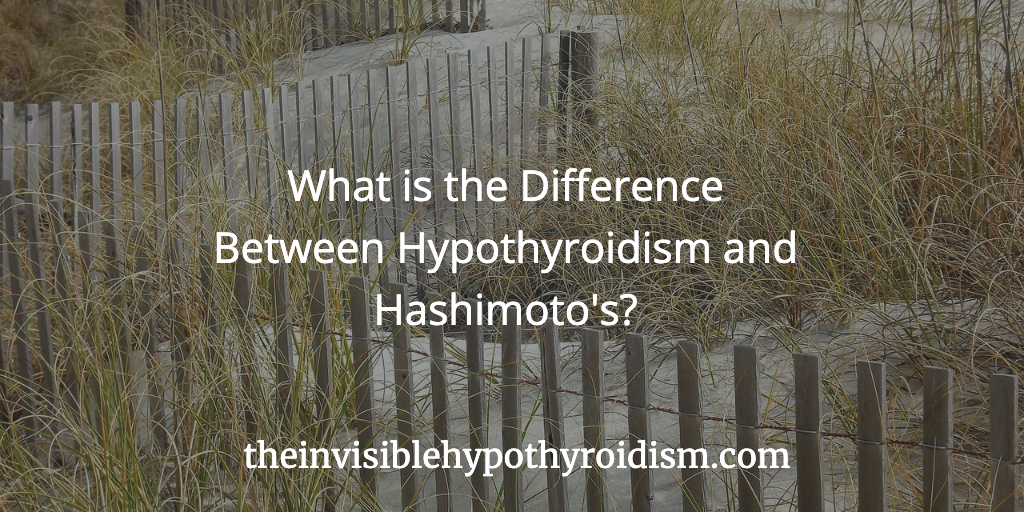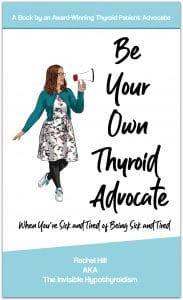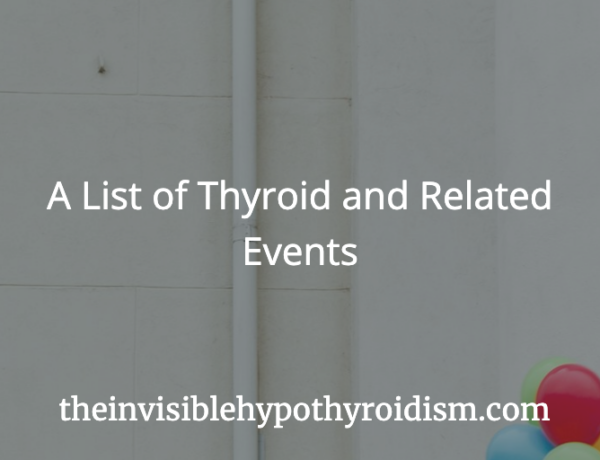Originally published on 7th October 2016 Last updated on 29th July 2024
I hear from many readers who are confused about the difference between hypothyroidism and Hashimoto’s. A lot are unsure of which they have, whether they have one or both and what difference it makes to their symptoms and treatment.
Hypothyroidism and Hashimoto’s are the most common types of thyroid disease. They share a lot of the same symptoms as both can equal a reduced amount of thyroid hormone in the body.
Related Article: Why It’s Important to Know if You Have Hashimoto’s
What is Hypothyroidism?
Put simply, hypothyroidism, sometimes called ‘an underactive thyroid’, is a condition where the thyroid gland does not produce enough thyroid hormone.
These hormones are needed for every process, cell and function in the body, so when they are low, a lot of stuff can be affected. This can include metabolic function, sensitivity to heat and cold intolerance, muscle aches and pains, fatigue, adrenal problems and more.
See a full article on what hypothyroidism is and how it affects people here.
What is Hashimoto’s?
Hashimoto’s is an autoimmune disease, which means that the immune system mistakenly tags and attacks the thyroid gland for destruction, thinking it’s an ‘invader’. The inflammation caused by this can understandably lead to many symptoms such as fatigue, muscle aches and pains, temperature fluctuations, mood swings and more.
Hashimoto’s is the most common cause of hypothyroidism at around 90%. [1]
Therefore, around 9 in 10 people with hypothyroidism have Hashimoto’s to thank for this. Hashimoto’s causes hypothyroidism when so much damage has been done to the thyroid gland, that it affects its ability to produce enough thyroid hormone.
Do I Have Both or Just One?
90% of us with hypothyroidism will also have Hashimoto’s, but you can have hypothyroidism without Hashimoto’s, for example, if your hypothyroidism is caused by something else.
Some people will also have Hashimoto’s without hypothyroidism, as they may not have lost enough thyroid function yet to have hypothyroidism. Many people start with just Hashimoto’s and go on to then develop hypothyroidism too. This can happen quickly, though typically progresses over several years.
The Difference in Treatment
Treatment for hypothyroidism typically involves replacing the lack of hormone via thyroid hormone replacement medication. Thyroid medication is used to return levels to ‘optimal‘.
Treatment for Hashimoto’s tends to look are calming down the inflammation and reducing thyroid antibody levels. However, this often isn’t recognised in mainstream medicine. In fact, there is no recognised treatment for Hashimoto’s in mainstream medicine, but more progressive medicine promotes the lowering of thyroid antibodies to put the disease in to ‘remission‘ and reduce symptoms.
Why It’s Important To Confirm What Thyroid Condition/s You Have
Treating not only my hypothyroidism but also the Hashimoto’s, by lowering my thyroid antibodies, has made a significant improvement in my health. For those with hypothyroidism and Hashimoto’s, treating both is often the best approach to reducing symptoms and getting better. I had to do more than just take thyroid medication.
Read about treatment for Hashimoto’s here.
Test For Hypothyroidism
A full thyroid panel test (thyroid function test) is required to diagnose hypothyroidism. Note that this isn’t just TSH, which is often used alone, but the other components of the thyroid panel too: Free T3 and Free T4.
If your doctor won’t test all of these, then you can find them online in the UK here and US here.
Tests For Hashimoto’s
In The UK, Medichecks is a very popular choice for inexpensive testing of thyroid antibodies. You can order the all important thyroid antibodies to check for Hashimoto’s.
A US lab you can order Hashimoto’s testing from is LetsGetChecked. You can easily order thyroid antibody testing from their website too.
Have you confirmed whether you have one of these or both?
You can click on the hyperlinks in the above post to learn more and see references to information given.
See also:
The book Be Your Own Thyroid Advocate: When You’re Sick and Tired of Being Sick and Tired, which builds on this article in detail, as Rachel discusses all the steps she took to get her Hashimoto’s and hypothyroidism under control so she could enjoy life again.
References:
[1] https://www.ncbi.nlm.nih.gov/pubmed/3066320






